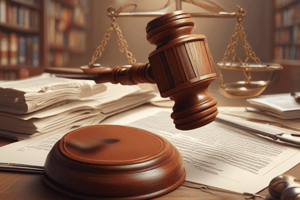Podcast
Questions and Answers
What is the main focus of civil law?
What is the main focus of civil law?
- Enforcing criminal justice
- Governing international trade
- Regulating private relations and obligations (correct)
- Regulating commercial activities
Which of the following would be considered a personal right under civil law?
Which of the following would be considered a personal right under civil law?
- The right to charge interest on a loan
- The ownership of land or estate
- The obligation to pay for a purchased item (correct)
- The right to property
How does civil law define 'legal acts'?
How does civil law define 'legal acts'?
- Bilateral acts including contracts (correct)
- Spontaneous legal incidents without prior agreement
- Acts that are only valid in criminal cases
- Unilateral transactions without contracts
What does commercial law govern?
What does commercial law govern?
Which of the following is NOT a characteristic of civil law?
Which of the following is NOT a characteristic of civil law?
In the context of civil procedure law, what is its primary purpose?
In the context of civil procedure law, what is its primary purpose?
Which of the following best describes 'real rights'?
Which of the following best describes 'real rights'?
What type of activities are included under commercial law?
What type of activities are included under commercial law?
What is the primary focus of the Romano Germanic legal system?
What is the primary focus of the Romano Germanic legal system?
Which statement accurately represents the Anglo Saxon legal system?
Which statement accurately represents the Anglo Saxon legal system?
What is a defining characteristic of the legislative process in the Romano Germanic system?
What is a defining characteristic of the legislative process in the Romano Germanic system?
In terms of legal rights, how does the Anglo Saxon system differ from the Romano Germanic system?
In terms of legal rights, how does the Anglo Saxon system differ from the Romano Germanic system?
Which legal principle is more emphasized in the Romano Germanic system compared to the Anglo Saxon system?
Which legal principle is more emphasized in the Romano Germanic system compared to the Anglo Saxon system?
Flashcards are hidden until you start studying
Study Notes
Civil Law
- Regulates private relations, imposing reciprocal obligations and rights.
- Applies to all legal relations between individuals regardless of their profession or social status.
- Deals with the law of person, property, obligations and enforcement of debts.
- Distinguishes between personal rights and real rights.
- Real Rights: Dominating authorities to a person on a determine thing.
- Example: The right of property, providing the owner the authority of exploitation, usage and vending the thing.
- Personal Rights: Links of law that enforce the debtor in the legal relation to give the creditor something, or to do or not to do.
- Example: The payment of the price due to a contract of purchase (obligation to give), the contract of labor (obligation to do), the term of non-competition provided in a contract of selling commercial premises (obligation not to do).
- Real Rights: Dominating authorities to a person on a determine thing.
- Distinguishes between legal acts and legal facts.
- Legal Acts: Include bilateral acts (contracts) and unilateral acts (like the promise to reward).
- Legal Facts: Consist on the non-contractual reality.
- Example: Tort.
Commercial Law
- Regulates commercial activity.
- Applies to:
- Acts of merchants, whether they are physical persons or legal statuses (moral persons) like companies or firms practicing commercial activities.
- Commercial activities include banking, tourism, insurance, and industry.
Civil Procedure Law
- Governs the administration of civil law and the control of procedures in front of judicial authority.
- Controls the process whereby parties to a dispute may have their rights recognized and remedies awarded.
Legal Systems
- Romano Germanic system: This system is prevalent in countries like Egypt and France. It's characterized by a clear division of power among the legislative, executive, and judicial branches of government.
- The legislative branch is responsible for enacting written laws.
- The judicial branch applies these laws in specific cases.
- The executive branch executes the laws.
- This system emphasizes a comprehensive legal framework that governs all aspects of society, including economic, political, and administrative matters.
- The Anglo Saxon system: This system is found in countries like the USA and UK. It emphasizes the importance of judicial precedents, where past court decisions shape the law for future cases.
- Judicial precedents: Decisions made by higher courts are binding upon lower courts, creating a system of legal continuity.
- In this system, the emphasis is on providing remedies to legal problems, and the rights of individuals emerge from these remedies.
Classification of Law
- Public Law: Concerns the relationship between individuals and the state.
- Private Law: Governs relationships between individuals.
Sources of Law
- Formal sources: These are the official sources of law, such as legislation, constitutions, and judicial precedents.
- Complementary sources: These provide additional guidance and context for legal interpretation, including legal doctrines, custom, and scholarly writings.
Application of Law
- In Region: Law is applied geographically, within specific territorial jurisdictions.
- In Time: Law is applied at a specific point in time, as legal rules can change over time.
- Types of Rights: There are various categories of rights, including personal rights, property rights, and contract rights.
- Personality: This concept emphasizes the individual's legal capacity and personality, recognizing their rights and responsibilities.
The Contract
- The contract is a legal agreement between two or more parties, creating obligations and rights for each party.
Studying That Suits You
Use AI to generate personalized quizzes and flashcards to suit your learning preferences.




